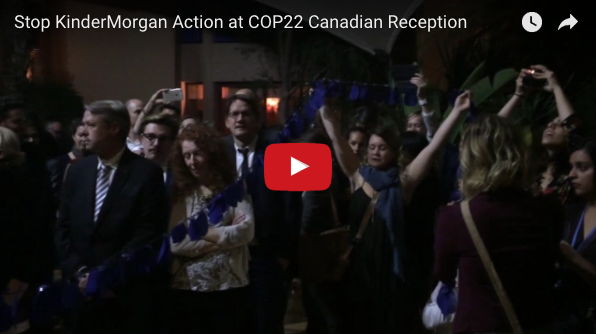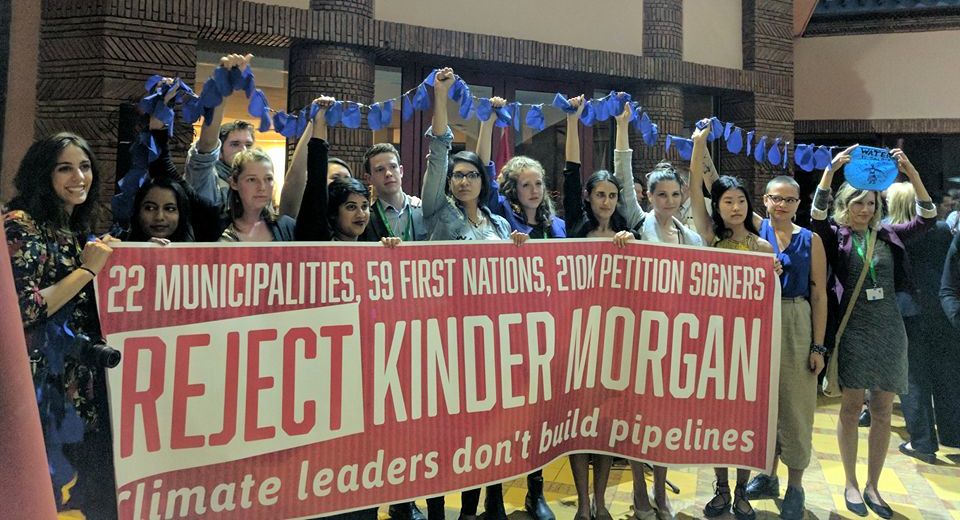CYDaily from COP22 -- Report from day 10
- Details
- Published on Friday, 18 November 2016 16:00
- Written by editor

Report from day 10
Global community calls on Canada to align actions with rhetoric on fossil fuel projects
The CYD’s Maya Menezes and Oil Change International’s Adam Scott were joined on a panel this morning by Lidy Nacpil of the Global Campaign to Demand Climate Justice from the Philippines, Benson Ireri of Christian Aid in Africa, and Kevin Hart, Regional Manitoba Chief with the Assembly of First Nations, Canada.
The panel came together to discuss Canada’s failure on climate action. In the recent weeks, Trudeau’s government has talked a big game on addressing the very real and pressing issues of global environmental destruction. Minister McKenna arrived in Marrakech this week with an entourage of youth. While it’s incredibly important that youth and indigenous youth be represented in climate negotiations and discussions, it was lost on no one that McKenna seemingly used her large entourage as a human shield to protect herself from actually addressing Canada’s catastrophic and fatal failures to not only Indigenous Peoples, but to the rest of the world.
In spite of making very strong commitments in the Paris Agreement, the Trudeau government continues to press forward fossil fuel expansion projects. This includes the recent approval of two LNG (liquid natural gas) pipelines as well as the expected approval of the Kinder Morgan pipeline in the coming weeks. This all continues in the face of strong and vocal opposition by hundreds of First Nations communities across the country. The irony of this situation was not lost on the international community.

Our panel brought together personal narrative with empirical evidence. Lidy Nacpil kicked off our panel with a discussion of climate financing. “Even developing countries like the Phillipines are doing their fair share. Climate finance is not something to just ‘help’.” Climate financing for the global south is not just a nice thing to do -- it is what is right and what is owed to those who will bear the most horrific ramifications of climate change. Rich polluters continue their ‘business as usual’ as if the Paris Agreement doesn’t exist. Ireri echoed these sentiments. There is no path forward where Canada can continue to approve fossil fuel projects. Canada’s legal and moral obligations to the lives of those most vulnerable on this planet must come before its corporate greed. If Canada continues to approve new projects, then they are demonstrating to the global community that they not only have no concept of global equity, but that they never cared to be a part of the solution in the first place.
Chief Hart spoke with conviction and powerful personal narrative. He wove together the traditional histories of the land and the critical role of women in protecting it. Hart also reiterated the wisdom and deep meaning in the words that have echoed in the halls of COP this year, ‘Water is life and water is sacred’. First Nations communities are suffering across the country in so many ways. Chief Hart highlighted food insecurity in the north, contaminated water in his community, housing crisis across the country -- and the lack of action from the federal government. Through all this pain, Hart also highlighted the powerful ways Indigenous communities continue to rise, to lead and to defend the frontlines of climate action.
Chief Kevin Hart closed by reinforcing that First Nations do not give their consent to pipeline expansion, and by condemning the empty words of solidarity and reconciliation of the government. “We cannot approve or support any new pipelines.”
Adam Scott from Oil Change International brought it home; “If we continue expanding the tar sands, and if Kinder Morgan gets approved, it will be impossible for Canada to meet our carbon targets (which are weak to begin with) and it will make decarbonization impossible.”
When the panel was finished their presentations, there was not a question posed by the audience. It would seem that unlike the Canadian Government, First Nations and civil society got it right the first time around.
Our summary just can’t fully capture it. You can watch the full thing here.No Climate Plan Without UNDRIP
Yesterday was an important day at COP22: Indigenous Women’s Day. A day to recognize the power and resilience of Indigenous women around the world. Led by Sadie, our team claimed space at the Conference Center where they spoke their truth and the truth of so many Indigenous folks in Turtle Island. They made it clear that there truly is no climate justice, and can be no climate plan, without the inclusion of the rights of Indigenous Peoples under UNDRIP (United Nations Declaration on the Rights of Indigenous Peoples). Sadie went on to highlight specific articles of UNDRIP - 26, 29, 31, 32, and 36 - that are pertinent to achieving climate justice and rights to land and resources, as well as TRC calls to action and the World Conference Paragraph 36.
The hypocrisy between Canada’s commitments and actions are palpable here. Over the past two weeks, we’ve heard many references to Trudeau’s commitment to respecting Indigenous rights with him saying, "It is time for a renewed, nation-to-nation relationship with First Nations peoples, one that understands that the constitutionally guaranteed rights of First Nations in Canada are not an inconvenience but rather a sacred obligation”. McKenna has also touted “No relationship is more important to our government and to Canada than the one with Indigenous peoples.” However UNDRIP remains unimplemented into Canadian law and all our attempts to engage McKenna on the implementation of UNDRIP have gone unanswered.
In response to this, our message was loud and clear, “No Climate Plan Without UNDRIP”.
We deliver 210,000 of your petition signatures to Catherine McKenna
At yesterday’s government-hosted reception for Canadians at COP 22, which was crawling with government reps, and oil industry lobbyists alike, our team confronted Minister McKenna about the Kinder Morgan pipeline. Following her address to the audience, we took to the podium chanting “climate leaders do not build pipelines.”
We quickly unfurled a large banner that held all 210,000
names as well as the 59 First Nations and 22 municipalities who have
opposed Kinder Morgan. With the banner as a backdrop, Kell spoke to
the glaring lack of consent from affected First Nations and the
government’s habit of hiding behind “consultation” rather than seeking
free, prior and informed consent from Indigenous Peoples. We talked
about the folks and movements we represent from back home and warned
the Minister that the government is in for a long fight if they
approve pipelines that allow for the expansion of the tar sands.
We closed our action by giving McKenna 210 blue water drops, each one representing 1,000 Canadians opposed to Kinder Morgan’s proposal. This served as a reminder that pipelines and the tar sands poison the water. Water that is not only essential for life but is sacred.
Minister McKenna accepted both the petition and the 210 water drops and promised to meet with us this morning.

Media round-up
-
The CYD’s Gab D’Astous in Ricochet: “Links to Big Oil suggest National Energy Board will remain a rubber stamp for industry.”
- The Canadian Press picked up our press conference! "It is a serious concern when we see the international community not honouring their commitments and we are concerned Canada is still pursuing their fossil fuel projects," Benson Ireri of Christian Aid Africa.
Canadian Youth Delegation
www.ourclimate.ca
fb: Canadian Youth Delegation
t: @CYD_DJC | #COP22CAN
The Canadian Youth Climate Coalition · Halifax, NS
B3K 2B6, Canada
You can also keep up with Canadian Youth
Delegation
on Twitter
or Facebook.
